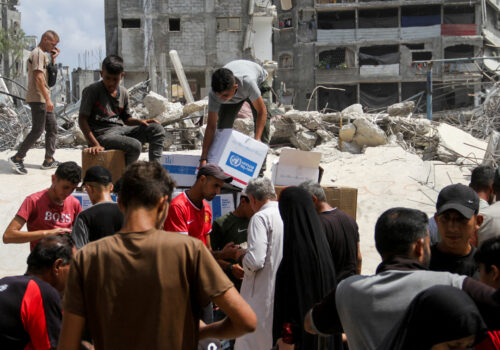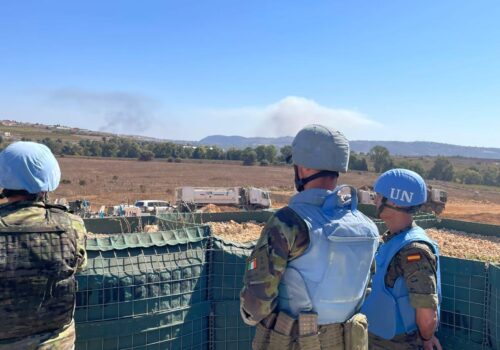Inside Israeli politics and public opinion with a pollster
As the Israel-Gaza war continues and expands regionally, Atlantic Council nonresident fellow Stefanie H. Ali spoke to Dr. Dahlia Scheindlin on October 15 to discuss how Israelis view Prime Minister Benjamin Netanyahu, the ongoing conflict, and the future.
Scheindlin is a Tel Aviv-based public opinion researcher and political advisor who has worked on nine national campaigns in Israel. Scheindlin is also the author of The Crooked Timber of Democracy in Israel: Promise Unfulfilled and is a policy fellow at The Century Foundation. She is also a regular columnist for Haaretz and has co-hosted The Tel Aviv Review podcast and the Election Overdose podcast at Haaretz in the past.
STEFANIE HAUSHEER ALI: There was support among the majority of Jewish Israelis for military action against Lebanese Hezbollah prior to the expansion of the war. It remains to be seen whether the over 60,000 Israelis and the over 1.2 million Lebanese displaced will be able to return to their homes and how the Israel-Iran confrontation will play out. Is Netanyahu gaining points politically for the operations in Lebanon? Is there public support for engaging Iran directly?
DAHLIA SCHEINDLIN: There is a contradictory dynamic. When it comes to the regional dimension, Israelis feel like there is an aggressive multi-front attack on them that is distinguished from Gaza in their minds. Israelis know there is an ongoing occupation and conflict with Palestinians, and they see the Hamas attack as genocidal, but they are disappointed over the failure to achieve the Gaza war aims, particularly the return of the hostages. But still, there is a more unifying national rallying when it comes to regional attacks.
As a result, every time there was a significant attack on senior Hezbollah figures or others from the Iran-backed Resistance Axis, like against Hamas political leader Ismail Haniyeh, there was an incremental, modest, but steady rise in support for Prime Minister Netanyahu, his party, and, to some extent, his political coalition.
The somewhat contradictory trend is that Jewish Israeli attitudes have actually been quite divided this year about what Israel should do in Lebanon. Over 60 percent of Jewish Israelis have supported taking an aggressive stance on Lebanon in past surveys. However, if survey respondents are given choices about gradations of the severity of the military action and possible ramifications, such as occupying southern Lebanon and/or war with Iran, attitudes are much more divided. About 50 percent of Jewish Israeli respondents will choose the more severe military options, and roughly the other half will choose a less severe option and prefer a role for diplomacy.
SIGN UP FOR THIS WEEK IN THE MIDEAST NEWSLETTER
That was up until a few months ago. Right before Israel began its significant ground operation in Lebanon on October 1, a survey by the Israel Democracy Institute showed Jewish Israelis were quite divided on whether there should be a ground operation. Forty-one percent were against it, and 47 percent were for it, but if you include lower support among Palestinian Arab citizens of Israel, the total was just 40 percent support. So the more imminent war becomes, and the more that is understood about what a full-scale war means, people start to consider actual consequences and alternatives.
There is surprisingly little public opinion survey data on how Israelis feel about military conflict with Iran so far. I have only seen one survey published that specifically asked about Israel getting directly engaged with Iran. A credible pollster conducted it this year for a hawkish think tank, and it did not have a huge sample, but it’s a legitimate survey. The survey found that roughly two-thirds of the Israeli population support a strike on Iran. However, that’s a total. In fact, these responses were also broken down by more granular options: About 37 percent supported a strike only if the US cooperated/participated (in Hebrew, the term used can mean either of these), and only 31 percent of respondents supported a strike on Iran in any case.
The 30 percent or so that support a strike on Iran, no matter what, overlap with the 30 percent that pretty consistently support Bibi (Netanyahu’s nickname), his coalition, and other hardline positions. They are hardline position supporters. In a number of countries globally where we see a rise of the hard right, their support is typically about 30 percent among the population. As a pollster, I find that interesting.
STEFANIE HAUSHEER ALI: Is the Israeli public concerned about the economic impact of the war? Some companies are re-considering large new investments into Israel, especially if they have a significant personnel footprint.
DAHLIA SCHEINDLIN: Everybody has been affected by this economically on some level. There is serious damage to certain key industries, not necessarily Israel’s biggest industries, but [the damaged industries] are numerous: construction, largely because Israel has blocked Palestinian workers from coming in from the West Bank; tourism, both international and Israeli tourists; [and] the service industry. Forty-six thousand small businesses have closed, and [this number] may hit 60,000 by year-end, according to reports. For purposes of comparison, about 70,000 businesses closed during COVID, which was an economic disaster.
Anecdotally, I can tell you that businesses are suffering even if they are still open. In my entire neighborhood, you cannot buy things from many shops, restaurants, or cafes after four or five p.m. The city used to be open all hours. Now, a lot of places I used to go to in the early evening are closed due to human resource shortages with people serving in the reserves.
The deficit is rising to 8 percent of the GDP, which is way beyond what it was in recent years. The defense budget has basically doubled. It rose by 87 percent, which is a huge drain on the national budget. Right now, the government is debating the cuts that will be needed to finance this. They are considering slashing some ministries. We have a bloated government with thirty-three different ministries. They may cut all subsidies to a range of needy people, including Holocaust survivors. They are also considering taxing widely used medium-term tax-free savings plans that are very popular among the middle class.
There is also a lot of fear about the shekel. It’s been erratic during the year, and people are worried about a currency collapse. Some people are exporting their money or using shekels to buy dollars and export it.
STEFANIE HAUSHEER ALI: What is your perspective on public attitudes about the impact on reservists? There are reports of reservists who have closed their businesses and are fatigued from the lengthy service they have already done with no end to the war in sight. And how does the issue of the ultra-orthodox possibly being drafted for the first time come into the public conversation?
DAHLIA SCHEINDLIN: On the issue of the 76-year-old frustration that ultra-orthodox have been given a free ride as some Israelis see it, there was attention on this long before the war. We have to keep in mind that this is an unprecedented level of war for Israel. It is all-consuming at a day-to-day level. Israelis are aware that there are more significant efforts to draft them, and the overriding sense is it is a very unfair situation with the ultra-orthodox not part of the draft. The profound frustration doesn’t boil over because Israelis have been habituated to that grating, ongoing anger about this fundamentally unequal situation for the country’s entire history and because people are so consumed by day-to-day survival that they can’t bring themselves to rally around that issue. People have limited bandwidth with [unmanned aerial vehicles] coming in, rocket fire, displaced people, and hostages. There is now coincidentally a stronger argument than ever before [due to the ongoing war], backed by Supreme Court decisions, that the ultra-orthodox have to be drafted. It is not yet fundamentally changing the political scene, but the issue of religion versus state—and this issue specifically—has historically been a main trigger for collapsing governments.
Right now, people are demonstrating for three related reasons: first, the hostages; second, anti-government sentiment; and third, the desire for an independent investigative commission on October 7, 2023. They also know there is a mechanism moving towards a wider draft in Israel. In addition, people are so existentially scared that there is lots of talk about unity, so some people just don’t want to deepen the social divide right now.
STEFANIE HAUSHEER ALI: Some thought the August killing of six hostages—including one high-profile Israeli-American—might result in mass-scale protests that could topple the Netanyahu government, but that hasn’t happened. In fact, the opposite seems to be occurring, with attention focused on intensifying military campaigns on multiple fronts. Do you see a realistic scenario that could break Netanyahu’s coalition before the next scheduled election in October 2026?
DAHLIA SCHEINDLIN: Public opinion survey research shows Netanyahu has recovered a lot of what he lost since October 7, but he is nowhere near a majority. His coalition is recovering in all polls relative to the first six months but is still unable to achieve more than fifty-four seats out of 120 total in the Knesset. You need sixty-one to form a government. He’s not there.
Netanyahu’s personal ratings are better: He is now in the low 40 percent range. That’s where he was for years, so he is back up in the polls compared to the first six months of the war. But we vote based on party, not direct elections for an individual. His party, at best in polls, has gotten twenty-six seats—mostly fewer than that, currently around twenty-four—rather than the thirty-two it got in the last election of 2022.
Netanyahu just added a fragment of a party to his coalition. Now he has sixty-eight seats rather than sixty-four, so this is an insurance policy. His government can still stay if some members rebel.
Right now, there is no imminent crisis that could cause the government to collapse, at least for the next few months, especially with no hostage deal on the table. We may be at a turning point where people are so worried about the regional war we are in and the fighting is so severe that no politician would seek to collapse the government. We are pretty close to that line now.
Some opposition voters and critics of Netanyahu also worry there won’t be elections in 2026. They think the war could be ongoing, too severe, and that the government will find a reason to delay them. I don’t think it’s an unreasonable worry since this government has authoritarian and fascist tendencies and is not terribly interested in the democratic process.
Israeli governments tend to fall before four years, but we are in extraordinary times.
STEFANIE HAUSHEER ALI: You’ve argued that Netanyahu is not just beholden to the far right but has, in fact, “become more like them.” No Israeli politician seems to be countering the prime minister’s approach with a viable alternative. Where is the Israeli opposition and what factors are constraining them?
DAHLIA SCHEINDLIN: The Israeli opposition is almost a non-entity. There are parties that are technically not in the government, so we call them the opposition. All of those parties have been winning a majority in surveys since the war and since before the war. But those parties are facing the same exact problems of going into a coalition government together, which made it difficult for them when they formed that government in 2021, which only lasted one year and then collapsed. They wouldn’t have an easy time forming a coalition.
The biggest and most popular opposition party leading in surveys is the party of Benny Gantz. He has criticized Netanyahu, but no one knows what he stands for. He offers no vision. He joined the war coalition, and his main credential is he is a career military person. We don’t know what he understands about democracy or the rule of law or other issues that were animating Israel before the war. He doesn’t articulate anything about the kind of country he wants to build or lead or how it would be different from what Israel did before 2023. He doesn’t talk about a two-state solution or how to end the war or reach a comprehensive resolution for the occupation of Palestinians.
The current actual opposition leader is centrist Yair Lapid—he has the second biggest party according to the last election. He is centrist in the sense of being 100 percent behind the war. He is not interested in a deep rethinking of Israel. He is committed to liberal democratic institutions. Notably, he is the only recent Israeli prime minister to support the two-state solution publicly but has barely mentioned this since the war.
There is a lot of atrophy in the Israeli political system, and no one has been truly offering an alternative to the biggest questions that have been driving this conflict forward: the Israel-Palestine conflict, the nature of Israeli democracy, and the need for a shared constitutional basis for this country. Those issues cannot be separated.
STEFANIE HAUSHEER ALI: Where do you see Israeli public opinion going in terms of the future—particularly the two-state solution or a different formulation such as a confederation? You’ve written about the striking “mirror images” of victimhood on both sides. How would you assess these attitudes compared to attitudes in the past during major threats or conflicts? In other words, do you think these attitudes could moderate over time if the conflict or threat reduces? Are more Jewish Israelis now in favor of re-settling Gaza or “transferring” Palestinians out of the territory?
DAHLIA SCHEINDLIN: Only a minority of either side supports a two-state solution, with a slight recent rise among Palestinians. Forty percent of Palestinians support a two-state solution, compared to just over 20 percent of Jewish Israelis, a significant decline.
On the Jewish Israeli side, it is less because they are against a certain peace formulation and more that they are against any comprehensive political solution involving Palestinian independence because they don’t trust Palestinians, they don’t see a Palestinian leader who would be a partner for peace, and they see all Palestinians as implicated on October 7. A political or diplomatic resolution is just not the language Jewish Israelis are thinking about. Palestinians are much more desperate to change the situation.
Forty-two percent of Jewish Israelis say they support annexing the West Bank and giving Palestinians limited rights—twice the rate of Jewish Israelis who support a two-state solution. Thirty-three percent of Palestinians support an inverse formulation where they are given the land and Jewish Israelis are given limited rights.
These are not good trends, but changing the reality could change minds. If we end the war, get a ceasefire, get the hostages back, de-escalate the regional fronts, launch a new diplomatic framework for containing Iran with incentives and pressure, and there is generally less bloodshed in all directions, people could start to change their minds. Then, people could be much more wary of breaking a phase of less violence.
October 7 also largely strengthened existing views. If a person broadly had the worldview that occupation and an unresolved military conflict were bad for Israel, the events of the last year have just strengthened that. The same portion of Israeli society still identifies as left-wing. The [number] of people who identify as left-wing dipped after October 7, but then it went back to the previous low level. Some people expected left-wingers to admit the error of their ways, and some did, but many reverted. The right wing hasn’t grown either: It did initially, but then it went back down—though still a majority. When I ask people if they have changed their views, they say something along the lines of: “I think what I thought before October 7 but more so.”
Stefanie Hausheer Ali is an Atlantic Council nonresident fellow and a senior director at international affairs consulting firm Rice, Hadley, Gates & Manuel LLC. The information in this article represents the views and opinions of the author and does not necessarily represent the views or opinions of Rice, Hadley, Gates & Manuel LLC.
Further reading
Tue, Oct 29, 2024
Gaza is a war without end. American interests must be reassessed.
MENASource By Frederic C. Hof
Israel’s appraisal of what it faces and its actions concerning civilians make it difficult for Washington to uphold a key strategic partnership without suffering severe diplomatic reversals in the region and around the world.
Thu, Oct 24, 2024
Tragic death of aid worker underscores Gaza’s postwar challenge
MENASource By Alicia Nieves
The international community has long been criticized for its inaction as Hamas gradually tightened its control over NGOs and civil institutions.
Tue, Oct 22, 2024
Israel versus Hezbollah: Not a full-scale war—yet
MENASource By Nicholas Blanford
The Israeli army appears to have absorbed some of the lessons of its troubled 2006 experience fighting against Hezbollah.
Image: People protest to demand a ceasefire deal and the immediate release of hostages kidnapped during the deadly October 7, 2023 attack by Hamas, in Tel Aviv, Israel, October 27, 2024. REUTERS/Violeta Santos Moura




